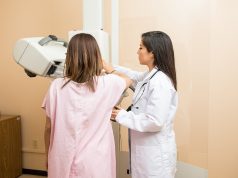Findings remain even after adjusting for common sociodemographic factors
WEDNESDAY, Oct. 9, 2019 (HealthDay News) — Regardless of the percentage of lifetime spent in the United States, foreign-born women are less likely to ever have received a mammogram compared with U.S.-born women, according to the Oct. 9 National Health Statistics Reports, a publication from the U.S. Centers for Disease Control and Prevention.
Tainya C. Clarke, Ph.D., M.P.H., from the National Center for Health Statistics in Hyattsville, Maryland, and colleagues used data from 29,951 women (aged 50 to 74 years) who participated in the 2005, 2008, 2010, 2013, and 2015 National Health Interview Survey. Trends in mammography screening were evaluated by nativity, birthplace, and percentage of lifetime living in the United States.
The researchers found that foreign-born women were less likely than U.S.-born women to have ever had a mammogram (88.3 versus 94.1 percent). Specifically, foreign-born women living in the United States for less than one-quarter of their lifetime were less likely to have ever had a mammogram (76.4 percent) or meet U.S. Preventive Services Task Force recommendations (55.0 percent) versus U.S.-born women. Foreign-born women living in the United States ≥25 percent of their lifetime remained less likely to have ever had a mammogram (90.9 percent) versus U.S.-born women. Findings remained even after adjusting for selected sociodemographic characteristics (e.g., education, age, marital status, and usual place of care).
“These findings may inform other research on the potential relationship with, and impact of, nativity, percentage of lifetime in the United States, and birthplace, and the likelihood of engaging in recommended preventive cancer screening,” the authors write.
Copyright © 2019 HealthDay. All rights reserved.








